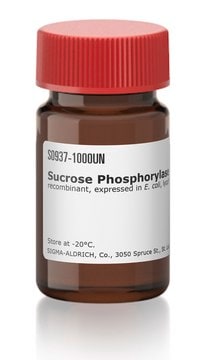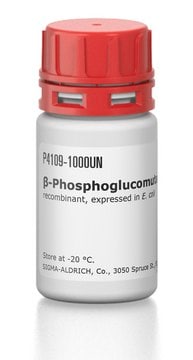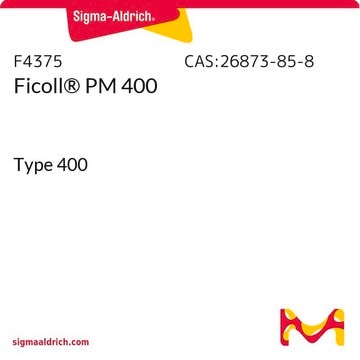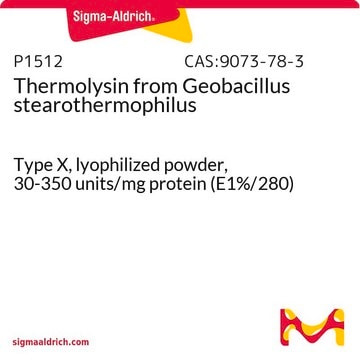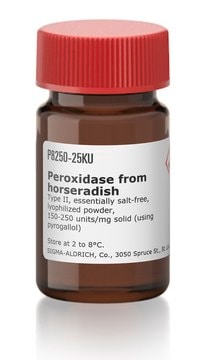M8284
Maltose Phosphorylase from Enterococcus sp.
recombinant, expressed in E. coli, lyophilized powder
Synonym(s):
Maltose:orthophosphate 1-β-D-Glucosyltransferase
Sign Into View Organizational & Contract Pricing
All Photos(1)
About This Item
Recommended Products
recombinant
expressed in E. coli
form
lyophilized powder
specific activity
≥9 units/mg solid
mol wt
90 kDa by SDS-PAGE
storage temp.
−20°C
General description
Maltose phosphorylase (MP) is a dimeric enzyme. This enzyme is classified under family 65 of the glycoside hydrolases. It is a member of the disaccharide phosphorylase family.
Application
Maltose Phosphorylase from Enterococcus sp. has been used as a component in coupled assay and ATPase activity assay to study its effects on ATPase activity, on the 90 kDa heat shock proteins (Hsp90) ATPase reaction and on background absorbance on the production of resorufin.
Maltose phosphorylase from Enterococcus has been used in a study to describe a new pathway for maltose utilization in lactic acid bacteria. It has also been used in a study to describe the transfer of glucosyl moiety of maltose to acceptors with alcoholic OH groups.
Biochem/physiol Actions
Maltose phosphorylase (MP) is a dimeric enzyme that catalyzes maltose and inorganic phosphate into β-D-glucose-1-phosphate and glucose.
Maltose phosphorylase not only transfers glucosyl moieties from maltose to other sugars but has been shown to also use phenolic compounds such as salicyl alcohol as acceptors.
Enzymatically converts maltose to D-Glucose.
Unit Definition
One unit will produce 1.0 μmole of D-Glucose from maltose per minute at pH 7.0 at 30°C.
Other Notes
Contains lactose.
Storage Class Code
11 - Combustible Solids
WGK
WGK 3
Flash Point(F)
Not applicable
Flash Point(C)
Not applicable
Certificates of Analysis (COA)
Search for Certificates of Analysis (COA) by entering the products Lot/Batch Number. Lot and Batch Numbers can be found on a product’s label following the words ‘Lot’ or ‘Batch’.
Already Own This Product?
Find documentation for the products that you have recently purchased in the Document Library.
Customers Also Viewed
Zhiqiang Zhang et al.
Analytica chimica acta, 615(1), 73-79 (2008-04-29)
A conductometric biosensor for phosphate detection was developed using maltose phosphorylase (MP) from recombinant Escherichia coli immobilized on a planar interdigitated electrode by cross-linking with saturated glutaraldehyde (GA) vapour in the presence of bovine serum albumin (BSA). The process parameters
Y Inoue et al.
Bioscience, biotechnology, and biochemistry, 65(12), 2644-2649 (2002-02-06)
Bacillus sp. RK-1 was isolated as a bacterium that produced maltose phosphorylase (MPase) in the culture supernatant. Screening was done from among about 400 isolates that could grow at 55 degrees C in a medium containing maltose as the sole
Yasushi Inoue et al.
Bioscience, biotechnology, and biochemistry, 66(12), 2594-2599 (2003-02-25)
The maltose phosphorylase (MPase) gene of Bacillus sp. strain RK-1 was cloned by PCR with oligonucleotide primers designed on the basis of a partial N-terminal amino acid sequence of the purified enzyme. The MPase gene consisted of 2,655 bp encoding
Hiroyuki Nakai et al.
The FEBS journal, 276(24), 7353-7365 (2009-11-19)
A gene cluster involved in maltodextrin transport and metabolism was identified in the genome of Lactobacillus acidophilus NCFM, which encoded a maltodextrin-binding protein, three maltodextrin ATP-binding cassette transporters and five glycosidases, all under the control of a transcriptional regulator of
Ana D Simonović et al.
Analytical biochemistry, 334(2), 312-317 (2004-10-21)
The phosphate precipitation reaction using ammonium molybdate and triethylamine under low pH has been applied to gel-based assays for detecting phosphate-releasing enzymes. The sensitivity of the assay is 10 pmol Pi/mm2 of 1.5-mm-thick gel. The assay is applicable to enzymes
Our team of scientists has experience in all areas of research including Life Science, Material Science, Chemical Synthesis, Chromatography, Analytical and many others.
Contact Technical Service